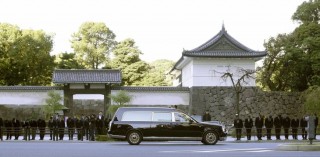Search
▼ Main funeral ceremony for Prince Mikasa held at Tokyo cemetery
- Category:Tourism
The main funeral ceremony for Prince Mikasa, an uncle of Emperor Akihito who served as an officer in World War II and later spoke out about the importance of peace, was held Friday at a cemetery in Tokyo eight days after his death at the age of 100.
The ritual, called the renso no gi rite, took place at the Imperial family’s Toshimagaoka Cemetery in Tokyo’s Bunkyo Ward. His wife, Princess Yuriko, 93, served as the chief mourner at the Shinto-style funeral.
In line with custom, the emperor and his wife, Empress Michiko, did not attend Friday’s ceremony.
A hearse carrying the prince, believed to be the oldest ever member of the more 2,500-year-old Imperial family, passed in front of the Imperial Palace in Chiyoda Ward after departing his former residence on the grounds of the Akasaka Estate in Minato Ward en route to the cemetery.
The prince’s body was to be cremated in the afternoon at a crematorium in Shinjuku Ward before his ashes are interred in a mausoleum at the cemetery.
Prince Mikasa, the youngest brother of Emperor Hirohito, the current Emperor’s father, was fifth in line to the Imperial Throne. He died at 8:34 a.m. on Oct. 27 of heart failure.
The prince, who served in Nanking, China, as an Imperial Japanese Army officer for a year during the war, began criticizing the military leadership even before the war’s end.
In a book published in 1984, he recalled being shocked at atrocities committed by the military in China while he was serving.
He later pursed his academic interests and became a scholar of ancient Oriental history.
The prince was admitted to St. Luke’s International Hospital in May for acute pneumonia. His heart functions deteriorated suddenly before he passed away last month. Several funeral rites have already been held.
The death of Prince Mikasa leaves only four heirs to the Chrysanthemum Throne, to which only males can succeed, amid concerns the Imperial family is aging and shrinking.
In August, Emperor Akihito expressed his readiness to abdicate in a rare video message, saying he was “worried that it may become difficult” for him to carry out his duties as the symbol of the state in accordance with his advanced age.
- November 4, 2016
- Comment (0)
- Trackback(0)


